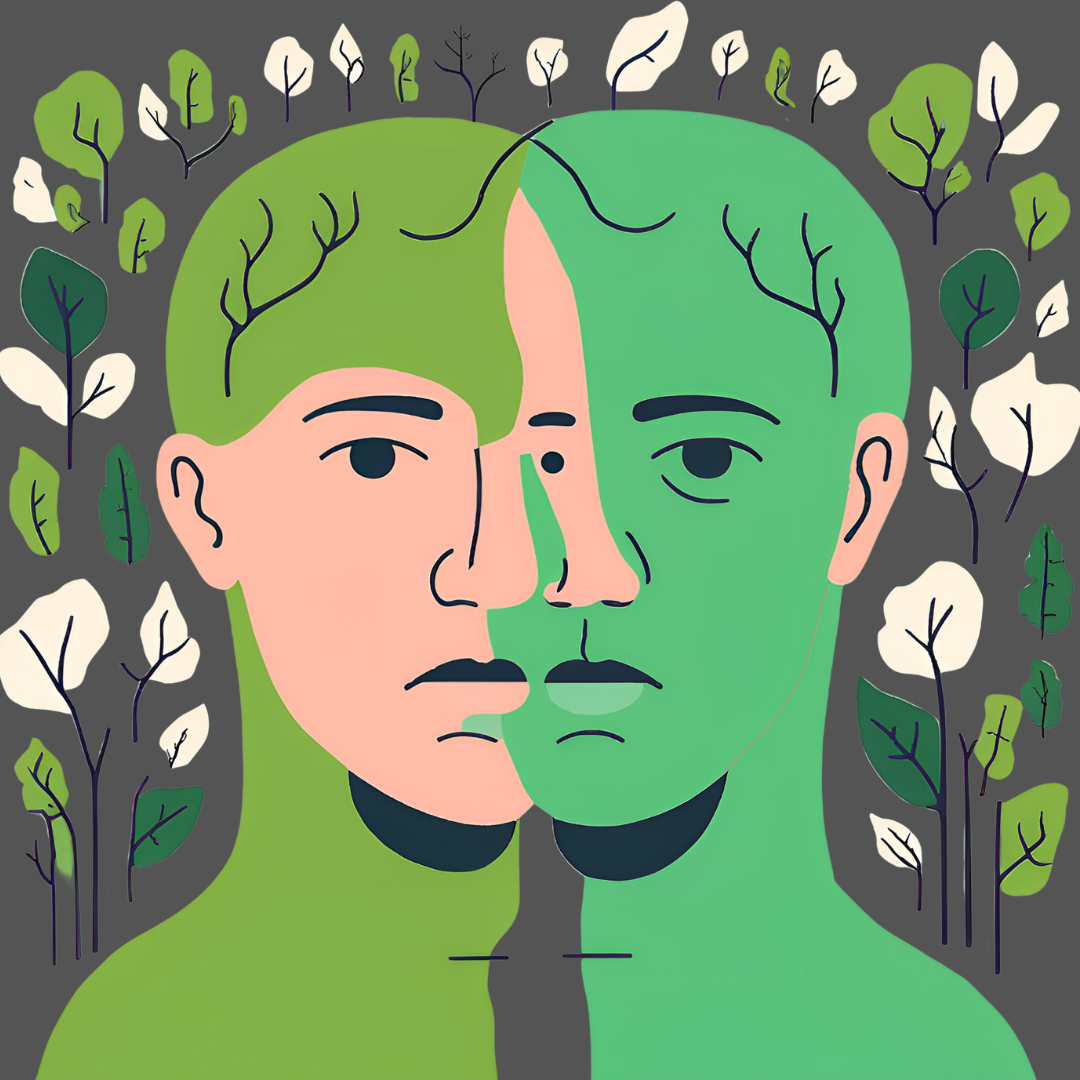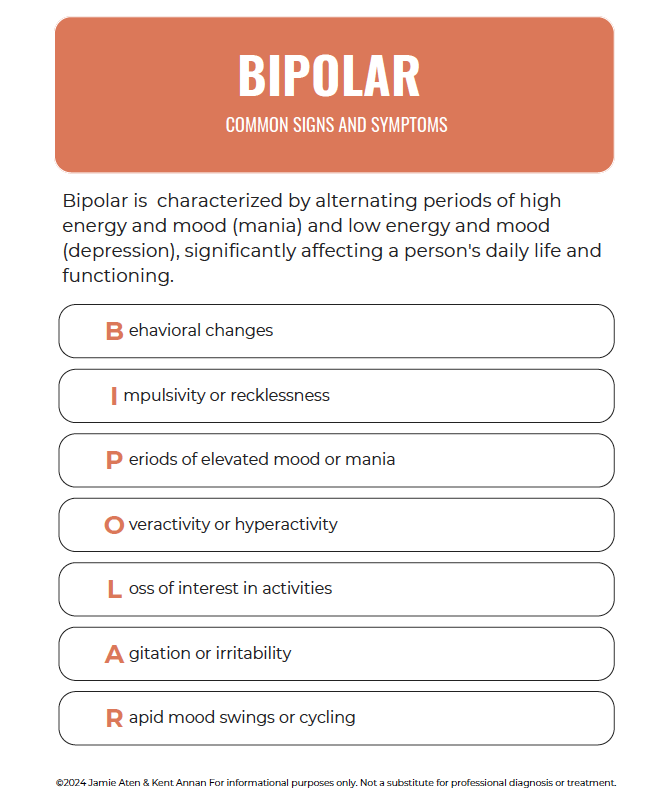
BIPOLAR DISORDER: AN OVERVIEW OF ITS SYMPTOMS AND FACT SHEET
If you have ever wondered where the term “bipolar” comes from – it refers to “two poles,” representing the extremes of mania and depression. It was first introduced in 1980 in the American Psychiatric Association’s (APA) Diagnostic and Statistical Manual of Mental Disorders (DSM), a highly influential publication that sets the standard for the classification and diagnosis of mental health conditions worldwide.
Bipolar disorder is a serious mental health condition characterized by significant mood swings, ranging from extreme highs (mania) to deep lows (depression). These mood changes can be intense and disruptive, affecting most if not all aspects of a person’s life, including their behavior, relationships, and overall well-being. Recognizing the symptoms of bipolar disorder is essential for understanding the condition and seeking appropriate treatment. Below, we explore some of the key symptoms associated with bipolar disorder.
Please note that this should be used as an aide but not as a formal evaluation or diagnosis method. If you suspect that you or a loved one is suffering from bipolar disorder, please don’t hesitate to reach out to us or to a trusted professional.
Behavioral Changes
One of the most noticeable symptoms of bipolar disorder is a shift in behavior, often aligned with the individual’s mood / emotional state. During manic episodes, behavior may become more erratic, with individuals engaging in activities that seem out of character. This might include taking on multiple projects at once, talking rapidly, or displaying unusual levels of energy and enthusiasm. Conversely, during depressive episodes, individuals may become withdrawn, lethargic, and uninterested in activities they once enjoyed.
Impulsivity and Recklessness
Impulsivity and reckless behavior are common during manic phases of bipolar disorder. Individuals may make hasty decisions without considering the consequences, such as spending large amounts of money, engaging in risky behaviors, or pursuing unrealistic goals. This impulsivity can lead to significant problems in both personal and professional life, often resulting in feelings of regret or guilt when the manic phase subsides.
Periods of Elevated Moods or Mania
Mania is one of the defining features of bipolar disorder, characterized by periods of unusually elevated mood, energy, and activity levels. During a manic episode, an individual may feel euphoric, overly optimistic, or invincible. They may also have grandiose ideas and an inflated sense of self-confidence. However, this elevated mood is often accompanied by poor judgment and can escalate to dangerous or self-destructive behaviors.
Overactivity or Hyperactivity
Overactivity or hyperactivity is another key symptom, especially during manic episodes. People with bipolar disorder may feel the need to be constantly active, taking on multiple tasks or projects simultaneously. They may have trouble sitting still or relaxing, and their mind might race with thoughts, leading to difficulty focusing on any one thing. This overactivity can be exhausting and may lead to burnout or other health issues.
Loss of Interest in Activities
During depressive episodes, individuals with bipolar disorder often experience a marked loss of interest or pleasure in activities they once enjoyed. This can include hobbies, social interactions, work, or even daily routines. This symptom, known as anhedonia, can lead to isolation and further exacerbate feelings of sadness and hopelessness. The shift from the highs of mania to the lows of depression can be particularly distressing.
Agitation or Irritability
Agitation and irritability are common symptoms during both manic and depressive phases. During mania, the high energy levels and racing thoughts can lead to frustration and irritability, especially if the individual feels obstructed or unable to accomplish their goals. During depressive episodes, irritability may stem from feelings of hopelessness or despair, leading to conflict with others and strained relationships.
Rapid Mood Swings or Cycling
Bipolar disorder is characterized by rapid mood swings, also known as cycling, between mania and depression. These shifts can happen over days, weeks, or even within a single day (a pattern known as rapid cycling). The unpredictability of these mood changes can make it difficult for individuals to maintain stability in their lives, affecting their work, relationships, and overall sense of self. The abrupt transitions between emotional highs and lows can be particularly disorienting and challenging to manage.
Seeking Help: Managing Bipolar Disorder
Bipolar disorder is a lifelong condition that requires careful management and treatment. While it can be challenging to live with the intense mood swings and behavioral changes that come with bipolar disorder, effective treatment can help individuals lead fulfilling lives. Treatment often includes a combination of medication, therapy, and lifestyle changes to help stabilize mood and manage symptoms.
If you or someone you know is experiencing symptoms of bipolar disorder, it’s important to seek professional help. Early intervention and ongoing support can make a significant difference in managing the condition and improving quality of life. At Oak Health Foundation, we are committed to providing comprehensive care for those dealing with bipolar disorder. Our team of experts is here to offer professional and spiritual support and guidance needed to navigate this complex condition. Don’t hesitate to reach out—help is available.
Check out the Spiritual First Aid Fact Sheet below regarding Bipolar Disorder for quick reference.

Enjoyed our blogpost? Subscribe to our newsletter for more resources on mental health and integrating the Gospel message in your healing journey.
If you found our resources useful, please consider donating to Oak Health Foundation, which is a 501(3)c nonprofit dedicated to providing resources regarding holistic mental healthcare and subsidized treatment for those in need.




